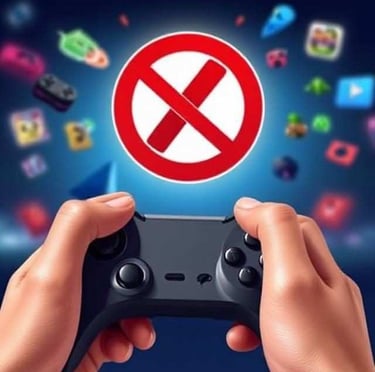Popular Gaming Apps and Sites in India Ban or Not? (2025 Update)
Discover the 2025 update on gaming apps in India. Which apps are banned, which remain legal, and how the new Online Gaming Bill changes everything.
FINANCE
Ayushi
8/22/20254 min read


The Indian gaming scene. Always moving. Always changing. And 2025? It’s already proving to be one of the biggest turning points.
The new Online Gaming Bill 2025 has flipped the industry upside down. Many apps that were once household names are gone. Some still there but only in bits and pieces. And others? They’ve managed to survive because they don’t involve real money.
So, which gaming apps are banned in India? Which ones still work? And what’s the future of online gaming here? Let’s break it down.
The New Law That Changed Everything
The Indian Parliament, August 2025. A bill was passed. Simple but strict.
No more real-money online games.
That means fantasy cricket apps, poker, rummy, prediction platforms—all the stuff where you pay and hope to win cash. They’re all banned. Full stop.
The government’s logic? Real money games are addictive. They cause people to lose savings, borrow money, fall into debts. There’s also the gambling angle. Even though companies argued that games like rummy are based on skill, the law doesn’t care. If money is involved, it’s not allowed anymore.
And if anyone tries to run these platforms anyway? Jail up to 3 years. Fines up to ₹1 crore. Even celebrities who promote these games could be in trouble. The ban is that serious.
But, not all is dark. The bill makes space for casual and e-sports gaming. No stakes, no gambling-like elements. Just playing for fun or competition. Those are fine.
Big Names That Shut Down
The ban hit the giants first.
Dream11. Probably the most famous fantasy sports app in India. Cricket fans used it almost every day during IPL. Overnight, gone. Paid contests stopped immediately. Only free-to-play options now.
MPL. Another giant. From fantasy sports to casual money games, MPL was everywhere. They too stopped deposits and told users to withdraw their remaining balance. Survival strategy? Likely pivoting to international markets and ads-driven gaming.
Zupee. Known for money-based Ludo and Snakes & Ladders. Same story. The money side is gone, but they still have the free-to-play version.
PokerBaazi. A23 Rummy. RummyCircle. All poker and rummy apps. Completely suspended. They’ve fought for years saying rummy and poker are skill, not chance. But the government clearly doesn’t agree.
Games24x7, which owned My11Circle and other platforms, is shutting down its cash divisions too. Probo, the opinion trading platform, already turned off its money-based features.
Basically, if you were playing any game that involved “add cash” and “withdraw winnings,” you can’t anymore.
What’s Still Legal
Now, not every app is banned. Some categories are safe.
Casual games? Fine. Think Ludo King, Candy Crush, Subway Surfers, puzzle games, racing games. No one is stopping you from playing those. They don’t involve money, so they’re not considered harmful.
E-sports? Totally fine. In fact, the government is talking about regulating and even supporting it. So tournaments of BGMI, Valorant, COD Mobile, FIFA—they’re all good to go. If there are prize pools, it’s not players staking money, it’s sponsors or organizers funding it. That’s different.
Educational and skill-based apps that don’t involve cash also remain legal. Chess apps, quiz apps, coding games—all safe.
So yeah, gaming itself isn’t banned. Just the real-money side of it.
The Older Bans
Quick rewind. Before 2025, India had already banned some games.
PUBG Mobile—gone in 2020. National security and data privacy reasons. But later it returned as BGMI (Battlegrounds Mobile India) under Krafton, with stricter rules for underage users. BGMI is legal now.
Free Fire—banned in 2022 with a bunch of other Chinese apps. Still hasn’t made a comeback officially, so as of 2025 it’s still banned.
So, when we talk about banned games, it’s not just money-based apps. Data security has been a big factor too.
Why Did the Government Ban Real-Money Games?
If you ask the government, they’ll tell you three main reasons.
One. Addiction. Real-money apps had a grip on young people. Folks playing day and night, chasing wins. Some stories even ended badly.
Two. Losses. Families complained about people losing huge sums. Credit cards maxed out. Savings gone. Some borrowed from lenders just to keep playing.
Three. Gambling. Even if Dream11 or MPL called it skill-based, for the government it looked like gambling. Especially when millions of people were pouring cash in daily.
So, in short, the government didn’t want to risk it anymore.
The Impact on Industry
Now comes the tough part. The industry itself.
Fantasy sports and real-money gaming was huge. Analysts predicted it would touch $3.6 billion by 2029. That projection? Doesn’t make sense anymore.
Startups like Dream11, MPL, Zupee employed thousands. Job losses are happening. Investors who put millions are suddenly unsure.
Celebrities too are hit. Cricket stars, Bollywood actors—they were earning from ads. About ₹17,000 crore was spent on promotions. All of that has collapsed overnight.
Some companies are planning to fight back legally. They may go to the Supreme Court arguing poker and rummy are skill games and deserve special treatment. But even if they win, it’s going to be a long road.
Others are shifting their focus. Dream11 has FanCode, which is a sports content platform. MPL might expand globally. Many are working on free-to-play versions with ads as revenue.
The industry is basically in survival mode.
The Future of Gaming in India
So what now? Where is this all going?
Honestly, two directions.
Casual and social gaming will grow. Apps that are free to play but make money from ads or in-app purchases will see big opportunities. Think about the success of Ludo King. That’s the model.
E-sports will explode. India already has a young gaming audience, and now with money games banned, more attention will shift to professional gaming tournaments. You’ll see bigger events, sponsorships, maybe even government-backed leagues.
Some companies will leave India. Real-money apps may set up outside, in markets where laws are more relaxed.
And finally, regulation. The government is setting up a national authority. They’ll control how games work, how data is handled, how players are protected. Maybe, someday, if rules are clearer, parts of the real-money sector might even come back. But not anytime soon.
Final Thoughts
2025 is a turning point for Indian gaming. Real-money games are banned. Dream11, MPL, Zupee, RummyCircle—they’ve all shut down their cash games. But casual apps and e-sports are alive and well.
If you’re a gamer, it means less about betting and more about playing for fun or competition. If you’re a company, it’s about adapting fast, because the old way of making money is over.
The government has drawn a hard line. For better or worse, the future of gaming in India will now be shaped by regulation, safety, and innovation—without gambling at its core.
About Company


